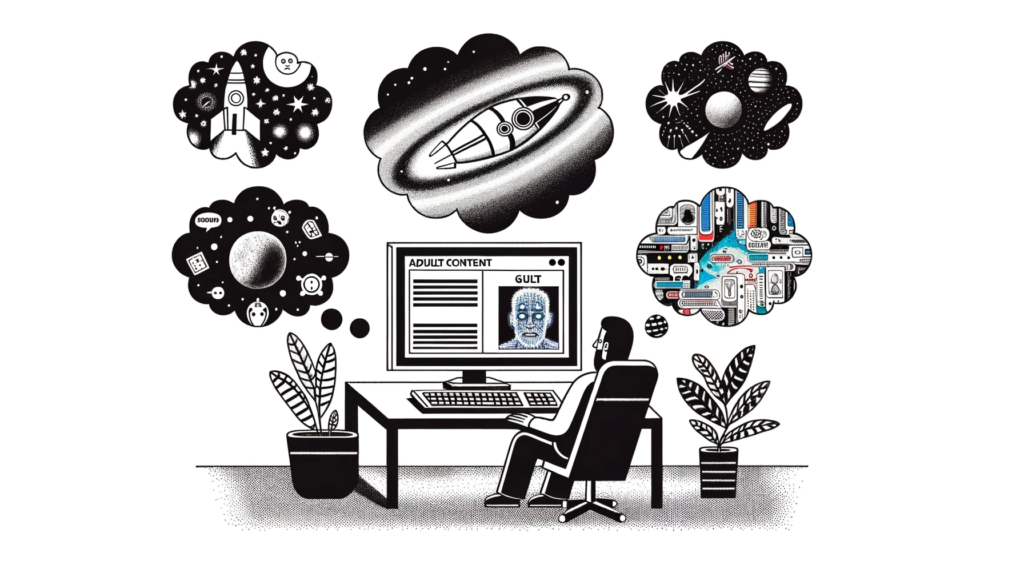
“The neural pathways we tread shape the way we think and act, whether we realize it or not.” – Jonathan Riley
The human brain, a marvel of nature, is designed to adapt and change based on our experiences. From the time we are babies to our adult years, our brain is constantly evolving, forming new connections, and strengthening or weakening existing ones. This capacity of the brain is termed “neuroplasticity”. It’s what allows us to learn new skills, adjust to different environments, and even recover from brain injuries. However, just as this plasticity can be a force for good, it can also be directed in ways that aren’t beneficial to us. One such influence is the regular consumption of pornography.
When we engage with any pleasurable activity, our brain releases a neurotransmitter called dopamine. Think of dopamine as the brain’s reward chemical. It’s what makes food taste good, hugs feel good, and songs sound wonderful. However, with pornography, the release of dopamine is excessive, more than what is seen in most natural rewards. Over time, as one consumes more and more pornography, the brain starts to adapt to these high levels of dopamine. This is where the trouble begins.
In response to the consistent flood of dopamine, the brain begins to reduce the number of dopamine receptors. This means that the more frequently someone watches porn, the harder it becomes for them to feel pleasure from other activities. As a result, they might find themselves feeling less satisfied with real-life experiences and relationships, craving the intense high that only pornography seems to provide.
But there’s more. The neural pathways, or the roads that our brain signals travel on, start to change and strengthen in response to repeated exposure to pornography. Imagine walking through a forest. The more you tread a particular path, the more worn and clear it becomes. Similarly, the more one indulges in porn, the stronger and more entrenched these neural pathways become. This makes it easier and more automatic for the brain to crave and seek out pornographic content, even when one might consciously wish to resist.
Furthermore, pornography often showcases exaggerated and unrealistic scenarios. Over time, as these images and scenes are imprinted on the viewer’s brain, they start to shape and skew their perception of reality. This can lead to distorted expectations about intimacy, relationships, and body image. Just as an artist who constantly uses distorted mirrors for reference will produce warped paintings, a brain fed on unrealistic depictions starts to see the world through a twisted lens.
Now, let’s talk about another brain region – the frontal cortex. This part of the brain is responsible for impulse control, decision making, and critical thinking. There’s growing evidence to suggest that regular exposure to pornography can negatively impact this region, weakening its ability to function properly. As a result, people might find it harder to control their impulses, make rational decisions, or think critically about their actions.
Some shocking facts to underscore these points:
- Intensity Escalation: Much like how drug users need to consume more of a substance to get the same high, regular porn users often find themselves seeking out more extreme or varied content to achieve the same level of arousal. This is a direct result of the desensitization caused by overconsumption.
- Young Minds at Risk: Today’s internet-savvy youth can stumble upon pornographic content at an alarmingly young age, sometimes even before their teens. Their brains, being more malleable and impressionable, can get wired to these stimuli even more rapidly, potentially affecting their development and understanding of healthy relationships.
- Brain Changes are Visible: Recent studies using brain scans have shown visible differences in the brain structures of regular porn users compared to those who don’t use porn. These changes resemble those seen in the brains of drug addicts.
- Quick Conditioning: Due to the brain’s neuroplasticity, even a short period of intense porn consumption can lead to noticeable changes in how the brain perceives and seeks pleasure.
In conclusion, pornography isn’t just a matter of personal choice or harmless entertainment. It has the potential to deeply affect and rewire the brain, influencing our perceptions, behaviours, and relationships. The changes it induces might be subtle at first but can have profound consequences over time. Understanding these impacts is crucial for making informed decisions about our engagement with such content.
Struggling with the effects of pornography addiction or any other mental health challenges, My Practice Counselling Melbourne is here to help. Jonathan Riley is a renowned porn addiction specialist in Melbourne. Contact us today to schedule a confidential consultation and take the first step towards positive change.